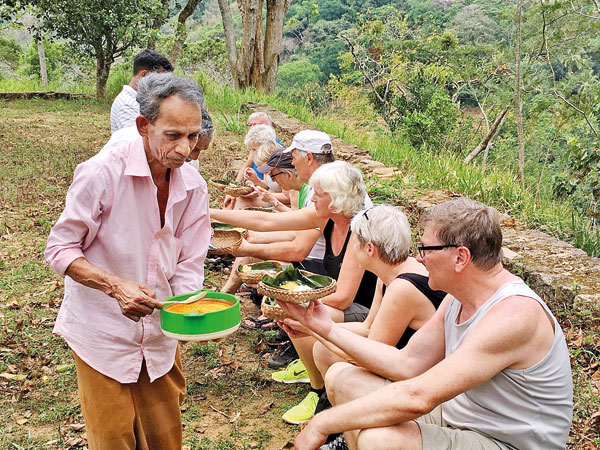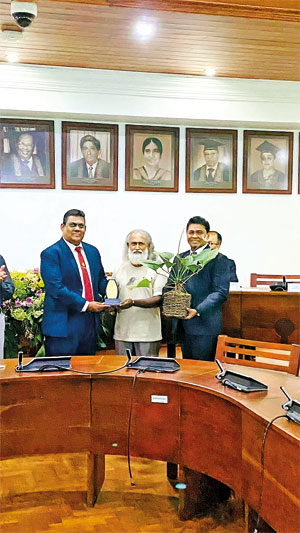News
Survey reveals irregular tourism operators lacking ‘green’ credentials can harm industry
View(s):By Wasantha Ramanayake
One of the biggest challenges of the tourism industry is to educate informal tourism operators about sustainable tourism practices and integrate their knowledge into their operations to attract more tourists, industry experts and academics say.
Around 90% of the informal sector tourist organisations have little knowledge of sustainable tourism, said Colombo University Professor Suranga Silva. As a result, they would not be able to sell their products and services to tourists conscious of protecting the environment. “The majority of these tourists are not only careful to minimise the negative impact of their travel but are also concerned with bringing benefits to local communities,” he said.

Local touch: There is a market for environmental-friendly and tradition-rich tourist attractions
A Colombo University survey of tourists reveals that nearly all are fully or partially concerned about the environmental impacts of the industry. It also reveals that tourists do not want the environment to be damaged by tourism development or to see undisposed garbage. They also do not like tourists being exploited and any infringement of their rights.
“A majority of them would not like elephants or any other animals being used in the industry; for instance, elephant rides,” noted Prof. Silva, adding that they even did not like stray dogs on the roads.
He said the purpose of the survey was to create awareness and empowerment among informal sector tourism operators, who make up 60% of all the tourism operators.
“Unless they engage in these positive practices, they will lose their customers and make their operations costly, and as a result, the country will also lose its place as a popular destination,” he said.
The new sustainable tourism unit of the Colombo University, the first in the country, was opened on October 2, and it will assist industry stakeholders as well as the sustainable tourism unit of the Sri Lanka Tourism Development Authority (SLTDA) to fill knowledge gaps.
The unit would partner with SLTDA to certify and award sustainable certification to tourism operators.
“We will lose our tourism markets if we continue along the same path of development,” he emphasised. As modern, educated, and high-spending tourists are more concerned about the environment, community development, and animal rights and welfare, they would demand sustainable practices from their tourist operators, he noted.
He also highlighted the lack of support for Sri Lanka Tourism from other government agencies and stakeholders to promote sustainable tourism.
The professor also highlighted the issue of the mushrooming of informal accommodations and restaurants, which do not follow any sustainable practices and, therefore, could only harm the industry.
The survey reveals a lack of awareness among tourism operators and even a smaller number of people who really practice it. “This makes it difficult for local travel and tour agents to promote their tour packages among the top destination markets in Europe and the UK,’’ Prof. Silva pointed out.

The new sustainable tourism unit of the Colombo University, the first in the country, was opened on October 2
However, there are still very few operators who do practise sustainable habits such as using local products, local wisdom, and employing the local community to provide an authentic cultural experience of the country’s hospitality, which most tourists cherish, he said.
It would not be costly to adopt sustainable practices, Prof. de Silva explained, adding that the collection and management of garbage could be done on a small scale by informal sector operators in a sustainable way. However, the lack of such actions, he cautioned, would pave the way for popular places like Ella to soon become stagnant like Hikkaduwa.
An unsustainable tourism industry “will kill the golden goose,” the authenticity of Sri Lanka, the very reason people want to visit Sri Lanka, warned Miguel Cunat, a sustainable tourism consultant.
He said sustainable tourism is about mitigating the negative effects of the tourism industry on the environment and society in an accountable way.
“This could be done by organisations in the tourism industry where various sectors contribute to global warming and climate change, destroying ecosystems and natural habitats of animals, putting immense pressure on historical and cultural monuments by overusing them to the point of deterioration and disrupting their routine functions,” explained Mr. Cunat.
Some sustainable practices could be implemented without cost, he said.
“Accommodation providers could advise visitors to save water and electricity; they could employ more local women; and the promotion of local food could be small things done towards sustainability, though it is a much more complex idea.”
The new sustainable tourism unit will be founded in the arts faculty of the university, which has one of the best social science departments in the country.
The university will start a certificate programme, a four-year special degree, and a one-year master’s degree in sustainable tourism management. The unit focuses on applied research. It also hosts international conferences and exhibitions on sustainable tourism.
The best way to say that you found the home of your dreams is by finding it on Hitad.lk. We have listings for apartments for sale or rent in Sri Lanka, no matter what locale you're looking for! Whether you live in Colombo, Galle, Kandy, Matara, Jaffna and more - we've got them all!

